

What Is Social Justice? Asylum seekers and refugees guide. Last updated 14 August 2015 Over the last decade the Commission has worked to promote and protect the rights of asylum seekers and refugees in Australia.
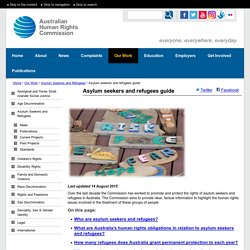
The Commission aims to provide clear, factual information to highlight the human rights issues involved in the treatment of these groups of people. On this page: Who are asylum seekers and refugees? An asylum seeker is a person who has fled their own country and applied for protection as a refugee. The United Nations Convention relating to the Status of Refugees, as amended by its 1967 Protocol (the Refugee Convention), defines who is a refugee and sets out the basic rights that countries should guarantee to refugees. Racereligionnationalitymembership of a particular social group orpolitical opinion.
Asylum seekers or refugees and migrants have very different experiences and reasons for moving to another country. Inequality in Indigenous Education. Over 200 years have passed since European colonisation and still Australia’s Indigenous population remain unequal to that of the rest of the society in education.
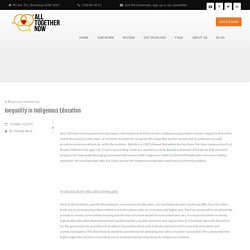
It is time for Australia to recognise this inequality and for society and its politicians to make proactive conscious efforts to rectify the problem. Statistics in 2007 showed that within the Northern Territory communities First People children from ages 5 to 17 years were failing numeracy and literacy tests. Results released in 2014 shows that not much progress has been made through government intervention with Indigenous children still 40-60% below the minimum reading standards. We must question why this is the case for the Indigenous population and how to solve this problem. Institutionalised educational inequality: Most of the problems, specifically relating to remote areas of education, are mostly due to poor teacher quality. Combating educational inequality: Homelessness. A profile of homelessness for Aboriginal and Torres Strait Islander people Higher rates of homelessness among Aboriginal and Torres Strait Islander people Compared with non-Indigenous Australians, Indigenous people: had four times the rate of homelessness (191 per 10,000 compared with 49 per 10,000 in the 2006 Census) made up 9% of the total homeless population (Indigenous people make up around 2.5% of the whole Australian population).
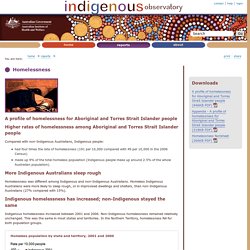
More Indigenous Australians sleep rough. Close the Gap: Indigenous Health Campaign. The poorer health of Australia's Aboriginal and Torres Strait Islander peoples when compared to the non-Indigenous population is no secret – and something can be done about it. Since 2006, Australia's peak Indigenous and non-Indigenous health bodies, NGOs and human rights organisations have worked together to achieve health and life expectation equality for Australia's Aboriginal and Torres Strait Islander peoples.
This is known as the Close the Gap Campaign. The campaign's goal is to close the health and life expectancy gap between Aboriginal and Torres Strait Islander peoples and non-Indigenous Australians within a generation. The campaign is built on evidence that shows that significant improvements in the health status of Aboriginal and Torres Strait Islander peoples can be achieved within short time frames. Inside the class divide - RN. Sitting in James's ornate East Melbourne drawing room, you wouldn't know the MCG is literally across the street.
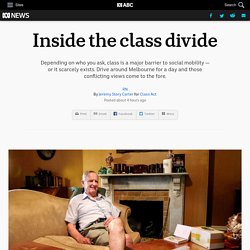
A towering wall shields any view of the passing masses and makes the inner-city home feel profoundly private. "Fortunately I can avoid seeing that and look at the trees," James says. James was a barrister and for a time, a state Liberal politician. He's retired now and enjoys playing Real Tennis — an archaic sport championed by typically affluent devotees, who see it as the purest form of the game. He's warm in person — offering to make me a coffee on my arrival — and talkative. But when asked how he feels about the concept of social class in Australia, he baulks a little.
Inequality – ACOSS. Excessive inequality is a problem for any society.
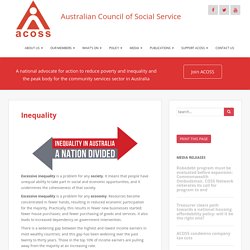
It means that people have unequal ability to take part in social and economic opportunities, and it undermines the cohesiveness of that society. Excessive inequality is a problem for any economy. Resources become concentrated in fewer hands, resulting in reduced economic participation for the majority. Practically, this results in fewer new businesses started; fewer house purchases; and fewer purchasing of goods and services.
It also leads to increased dependency on government intervention. The Gap: Indigenous Disadvantage in Australia. In 2008, the Australian government made a formal commitment to address Indigenous disadvantage in Australia, known as 'Closing the Gap', but what is the “gap”?
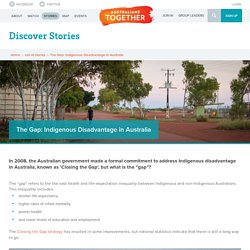
The “gap” refers to the the vast health and life-expectation inequality between Indigenous and non-Indigenous Australians. This inequality includes: Voices on Social Justice. Fact Sheets. Lenten Fundraising Appeal. Featured Stories Explore the weekly stories which humble and inspire us, and show how your contributions to Project Compassion help people build better lives for themselves, their families and their communities Get involved: 50 years of Project Compassion Last year, we celebrated 50 years since the first national appeal was held in Lent of 1965.
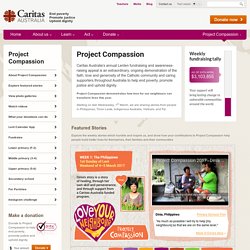
Take a trip down memory lane Sign up to our eNews to make sure you don't miss out on this year's Project Compassion. Create your personal online fundraising page! Explore Catholic Social Teaching Principles. Australia's Indigenous health crisis in-depth. The crisis facing Indigenous health has a long and complex history.
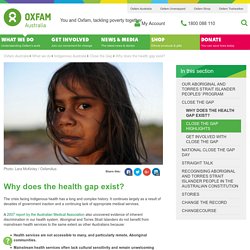
It continues largely as a result of decades of government inaction and a continuing lack of appropriate medical services. A 2007 report by the Australian Medical Association also uncovered evidence of inherent discrimination in our health system. Aboriginal and Torres Strait Islanders do not benefit from mainstream health services to the same extent as other Australians because: Health services are not accessible to many, and particularly remote, Aboriginal communities.Mainstream health services often lack cultural sensitivity and remain unwelcoming places for many Indigenous peoples. The Indigenous health workforce remains disproportionately low when compared to the number of Aboriginal and Torres Strait Islanders that make up the Australian population.It fails to address other root causes.
What needs to be done now? Aboriginal health in Australia - Creative Spirits. To us, health is about so much more than simply not being sick.
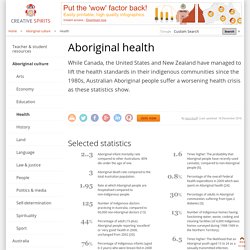
It's about getting a balance between physical, mental, emotional, cultural and spiritual health. Health and healing are interwoven, which means that one can't be separated from the other. —Dr Tamara Mackean, Australian Indigenous Doctors' Association [13] Australia is the only place on the planet where Indigenous health and wellbeing are going backwards. —Sydney Morning Herald [18] Hepatitis Hepatitis cartoon. Number of Aboriginal Australians suffering from chronic hepatitis B and C. Indigenous Health. From the Secretariat April 2017 - Australian Catholic Social Justice Council. Dear friends, Last month, the Refugee Council of Australia released an excellent report, State of the Nation: Refugees and people seeking asylum in Australia.
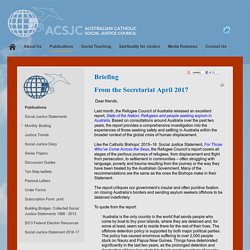
Based on consultations around Australia over the past two years, the report provides a comprehensive investigation into the experiences of those seeking safety and settling in Australia within the broader context of the global crisis of human displacement. News Monitor April 2017 - Australian Catholic Social Justice Council. Silver cross offers 'protection' from racism27-Mar-2017Wearing a simple silver cross is a 'powerful insurance' against racist attacks, writes Sharon Verghis in The Age. From the streets to helping others27-Mar-2017Homelessness is "something that just happens due to choices you make, the people you surround yourself around," says a 26-year-old success story of the Hutt St Centre homelessness service, reports The Southern Cross. Sustainable Development Goals.
Sustainable Development Goals End poverty in all its forms everywhere. Statistics - Refugee Council of Australia. 1309 HousingLitRev. Age Discrimination. Say no to ageism on International Day of Older Persons. The International Day of Older Persons, Saturday 1 October is an opportunity to highlight the important contributions older people make to society and raise awareness of the issues and challenges of ageing in today’s world. In 2014, Governments around the world adopted a resolution at the Economic and Social Council that recognised ageism as ‘the common source of, the justification for and the driving force behind age discrimination’. Australia’s seniors’ advocacy body COTA highlights research cited by the World Health Organisation reveals older people who have negative attitudes towards aging live 7.5 years less than those with positive attitudes, and have poorer recovery from disability and disease.
“If we embrace our ageing we will be happier, healthier and around for a lot longer,” COTA Australia Chief Executive Ian Yates says. “Internalised ageism is still a major issue that is not sufficiently recognised. Older people who internalise ageist attitudes die sooner. Know your rights: Disability discrimination. Know your rights: Disability discrimination Australian Human Rights Commission Download in PDFDownload in Word What is disability discrimination? Disability discrimination is when a person with a disability is treated less favourably than a person without the disability in the same or similar circumstances. For example, it would be ‘direct disability discrimination’ if a nightclub or restaurant refused a person entry because they are blind and have a guide dog. Face the facts: Disability Rights. Back to main Face the Facts page Many people will have a disability at some stage in their lives.
For some, the disability will be temporary. Social Inclusion and Human Rights in Australia. KPMG Level 15, 10 Shelley Street, Sydney Tuesday 20 August 20137:45am (Check against delivery) Disability and Global Poverty - Caritas Australia. Aboriginal prison rates - Creative Spirits. Aboriginal prison statistics: “Every year it gets worse” Since 2004, the number of Aboriginal Australians in custody has increased by 88% compared to a 28% increase for non-Aboriginal Australians.[47] Australia is heading towards one in two of the prison population comprised by Aboriginal prisoners – by 2020.
Youth justice. Rethinking youth justice: there are alternatives to juvenile detention. Domestic Violence Crisis Service. Australian Capital Territory Policing. ACT Policing is a proud supporter of White Ribbon Day held on 25 November each year. For more information visit whiteribbon.org.au We're strongly committed to protecting the community against family violence. As first responders, we see the devastating effects this behaviour can have on victims, their children, extended family, friends and the whole community.
In October 2015, ACT Policing launched the Family Violence Coordination Unit to ensure our officers implement best practice policies and procedures when responding to incidents of family violence. Training is provided to frontline officers on legislation reform, and the unit works closely with other police forces across Australia to deliver the best outcomes for victims. Family and domestic violence - Australian Government Department of Human Services. We support people affected by family and domestic violence by providing information, resources and referrals. Call 000 if you, a child or another person is in immediate danger.
Dignity and Work 2016 - Australian Catholic Social Justice Council. Minimum Wage Australia. When you’re looking for work, or even if you’ve already got a job, one of the main things on your mind is money. So how do you know if you’re getting paid properly? Things that can affect how much you're paid. Creating a framework for ending homelessness. What is homelessness? Learn About Homelessness - StreetSmart Australia. What is modern slavery? - Anti-Slavery International. Minimum wages - Fair Work Ombudsman. Racism. It Stops With Me. Standing up to racism. UNHCR - Asylum-Seekers. Asylum seekers and refugees: what are the facts? Sexism. The origins of sexism. Poverty – Poverty and Inequality. More than 1.1m Australian Children Living In Poverty. Housing affordability. Corrections, Prisons and Parole. Helping Offenders & Prisoners’ Families. Humanrights.gov. Study spanning 20 years highlights a structural housing crisis facing renters.